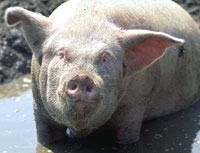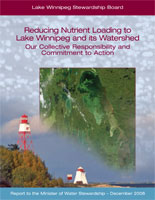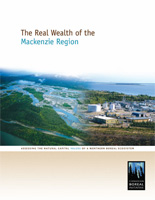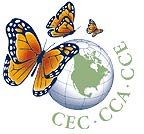
News |
- Water Licence Denied - Planning Comes First
- Manitoba Hog Industry Sustainability Scoping Starts
- Lake Winnipeg Stewardship Board Final Report
- Manitoba Hydro to Upgrade Pointe du Bois Dam
- Suzuki Tour Update: Bottled Water is Wrong
- Mackenzie 10 Times More Valuable Undeveloped
- Saskatchewan Energy Future Assessed
- Canada Suppressing Reports Under NAFTA
- Canada's Environment Commissioner Terminated
- Grassy Narrows Declares Moratorium
- New Oil Wells - Manitoba 2006 Record
- Métis Harvesting Agreement Upheld
| Water Licence Denied - Planning Comes First | 19 February 07 |
 Conservation Minister Stan Struthers announced February 14, 2007 that the province will follow the recommendations of the Clean Environment Commission (CEC) report on the Pembina Valley Water Cooperative's (PVWC) proposal for a supplemental groundwater supply system. The report recommends against licensing the proposed project until further work has been carried out. The project would have involved inter basin transfers of water. Conservation Minister Stan Struthers announced February 14, 2007 that the province will follow the recommendations of the Clean Environment Commission (CEC) report on the Pembina Valley Water Cooperative's (PVWC) proposal for a supplemental groundwater supply system. The report recommends against licensing the proposed project until further work has been carried out. The project would have involved inter basin transfers of water."Any plan must maintain public confidence and long-term sustainability, and the Clean Environment Commission has offered recommendations for the region. We will follow the recommendations of the CEC," said Struthers. The CEC issued eight recommendations with respect to the Pembina Valley Water Cooperative's proposal (see page 50), and concluded in its report that "before individual groundwater projects are authorized, the larger planning initiatives envisioned by the government in recent legislation and policy, [must] be completed." "It is time to step back, and make sure that we plan before we develop. Water conservation, and the precautionary principle will avert damaging new water projects," said Gaile Whelan Enns, Director, Manitoba Wildlands. View the February 14, 2007 Government of Manitoba press release View the CEC's Report on Public Hearing - Pembina Valley Water Cooperative Supplemental Groundwater Supply System (PDF) View the CEC hearings Exhibits: Exhibitor List (PDF) and the Exhibits Visit Manitoba Wildlands' Water Projects webpage for the Pembina Valley Water Cooperative Sources: Government of Manitoba, Clean Environment Commission
|
|
| Manitoba Hog Industry Sustainability Scoping Starts | 16 February 07 |
 The Clean Environment Commission (CEC) has completed three 'scoping' meetings to assist with identification of issues to be addressed by the CEC Panel as part of their review of the environmental sustainability of Manitoba's hog production industry. The meetings for the actual review will take place during March and April 2007 across the province. This review is mandated by the Manitoba government, with terms of reference issued by the Conservation Minister. The Clean Environment Commission (CEC) has completed three 'scoping' meetings to assist with identification of issues to be addressed by the CEC Panel as part of their review of the environmental sustainability of Manitoba's hog production industry. The meetings for the actual review will take place during March and April 2007 across the province. This review is mandated by the Manitoba government, with terms of reference issued by the Conservation Minister. Groups and individual members of the public made a number of presentations at the January 22nd, 23rd, and 24th scoping meetings. Public interest in the review is high, as evidenced by participation at scoping meetings and by letters to the editor in response to media coverage of the CEC review. The CEC Panel developed the Guide to Public Participation in the Hog Production Industry Review. "I encourage citizens and citizen based organizations throughout the province to engage in the investigation of Manitoba's hog industry. The CEC will soon discover this industry is not sustainable and that the moratorium placed on the construction of new barns may have to be extended for years to come." Glen Koroluk of Beyond Factory Farming Coalition, told Manitoba Wildlands. View Clean Environment Commission web page for Hog Production Industry Review View Reid Reporting's webpage for transcripts of the January 22, 23, 24, 2007 Hog Production Industry Review scoping meetings View the dates and locations for CEC review meetings of hog production environmental sustainability in Manitoba (PDF) View CEC's Guide to Public Participation in the Hog Production Industry Review (PDF) View Manitoba Wildlands' November 17, 2006 news item View Manitoba Wildlands' Water Projects and Licensing page Source: Clean Environment Commission
|
|
| Lake Winnipeg Stewardship Board Final Report | 15 February 07 |
 Manitoba Water Stewardship Minister Christine Melnick released the Lake Winnipeg Stewardship Board's (LWSB) final report February 6, 2007, accepting in principle all 135 recommendations in the report. Manitoba Water Stewardship Minister Christine Melnick released the Lake Winnipeg Stewardship Board's (LWSB) final report February 6, 2007, accepting in principle all 135 recommendations in the report. Minister Melnick claims that the province has already acted on or initiated action on 113 of the recommendations contained within the Lake Winnipeg Stewardship Board's December 2006 report. However, Manitoba Liberal Party Leader, John Gerrard noted that the LWSB is recommending immediate action to regulate the amount of phosphorus contained in cleaning supplies - only weeks after the Doer NDP dismissed a Liberal bill to ban phosphorus from dishwasher detergents in Manitoba. Minister Melnick indicated that immediate next steps on priority areas outlined by the Lake Winnipeg Stewardship Board will include:
View the Lake Winnipeg Stewardship Board's December 2006 report, Reducing Nutrient Loading to Lake Winnipeg and its Watershed - Our Collective Responsibility and Commitment to Action (PDF) View the February 6, 2007 Government of Manitoba press release View the February 6, 2007 Manitoba Liberal Party Caucus press release (DOC) Visit the Lake Winnipeg Stewardship Board's website Visit Manitoba Wildlands' Lake Winnipeg page Sources: Government of Manitoba, Manitoba Liberal Party Caucus
|
|
| Manitoba Hydro to Upgrade Pointe du Bois Dam | 12 February 07 |
 Manitoba Hydro is holding three open houses to provide the public with information about the modernization alternatives under consideration for Manitoba Hydro's Pointe du Bois Generating Station, on the Winnipeg River. Representatives of Manitoba Hydro will respond to comments and questions and receive feedback. See below for dates and locations. Manitoba Hydro is holding three open houses to provide the public with information about the modernization alternatives under consideration for Manitoba Hydro's Pointe du Bois Generating Station, on the Winnipeg River. Representatives of Manitoba Hydro will respond to comments and questions and receive feedback. See below for dates and locations.Pointe du Bois Generating Station is located on the Winnipeg River, approximately 150 km northeast of Winnipeg. It is the oldest power plant still in operation on the river and was built by City Hydro, later known as Winnipeg Hydro, and acquired by Manitoba Hydro in 2002. Gaile Whelan Enns, director of Manitoba Wildlands, observed, "Manitobans are waiting for the long promised Energy Plan for our province. We would recommend that both the government and the utility disclose the whole plan for the six dams on the Winnipeg River as soon as possible." Manitoba Hydro public meetings regarding Pointe du Bois, (Time for all meetings: 3-8pm):
Source: Manitoba Hydro
|
|
| Suzuki Tour Update: Bottled Water is Wrong | 09 February 07 |
 Canadians wanting to do something about the environment can start by drinking tap water, says environmentalist David Suzuki. Canadians wanting to do something about the environment can start by drinking tap water, says environmentalist David Suzuki."I think that we've got to drink the water that comes out of our taps, and if we don't trust it, we ought to be raising hell about that." Suzuki also pointed out that plastic water bottles generate waste and potential health hazards because of their chemical composition. Suzuki made the remarks while in St. John's February 1st to launch his cross-country speaking tour - "If you were Prime Minister..." aimed at engaging people in politics, particularly environmental issues. On his 50-city tour, David Suzuki will be visiting Winnipeg on February 20th. Manitoba Wildlands is hosting the event at the Burton Cummings Theatre at 7:30pm. Tickets are going fast!! They are available for $9 each plus TicketMaster charges and a $1 Burton Cummings Theatre renovation fee. Tickets are available Online at ticketmaster.ca, Charge-by-phone at 780-3333, and at all TicketMaster Ticket Centres. Come see David Suzuki and cast your vote for the environment! View David Suzuki's YouTube video and submit your own suggestions View the David Suzuki Foundation Tour website, and submit your written vote Listen to David Suzuki's audio advertisement (MP3) Listen to COOL IT The Global Cooling Song by Raffi and the David Suzuki Foundation Tour dates across Canada: Quebec-Ontario-Manitoba Saskatchewan-Alberta-British Columbia View the February 1, 2007 CBC article View Manitoba Wildlands' January 24, 2007 news item Source: CBC
|
|
| Mackenzie 10 Times More Valuable Undeveloped | 08 February 07 |
 The Mackenzie River region in the Northwest Territories is worth 10 times more in its natural state than the value industrial development would bring. This is the main message of the report, The Real Wealth of the Mackenzie Region, released January 31, 2006 by the Canadian Boreal Initiative (CBI) and authored by two ecological economists Sara Wilson and Mark Anielski. The Mackenzie River region in the Northwest Territories is worth 10 times more in its natural state than the value industrial development would bring. This is the main message of the report, The Real Wealth of the Mackenzie Region, released January 31, 2006 by the Canadian Boreal Initiative (CBI) and authored by two ecological economists Sara Wilson and Mark Anielski.The Mackenzie region is located within Canada's boreal forests, which can store more carbon dioxide than any similar ecosystem on Earth, including tropical rain forests. "This report is the first watershed-based natural capital review in Canada, if not the world", said Mark Anielski. "Our country has been richly endowed, but these ecological services do not count towards our Gross Domestic Product (GDP) - the traditional measure of economic progress. We need to start counting the value of our natural capital so we can make informed stewardship decisions that balance broader ecosystem and cultural values with sustainable economic growth." View the January 31, 2007 Canadian Boreal Initiative (CBI) press release View the CBI backgrounder on The Real Wealth of the Mackenzie Region (PDF) View the CBI report, The Real Wealth of the Mackenzie Region (PDF) View the January 31, 2007 Globe and Mail article View the January 31, 2006 CBC article View Manitoba Wildlands' Forests pages - Boreal Conservation Reports on the CBI report Sources: CBI, Globe and Mail, CBC
|
|
| Saskatchewan Energy Future Assessed | 08 February 07 |
 The Saskatchewan Environmental Society (SES) has released a report showing that 50 percent of Saskatchewan's electricity needs should come from sustainable, renewable energy resources by 2025. Saskatchewan's consumption of energy rose by 34 percent between 1993 and 2003. As of 2003 Saskatchewan's energy consumption on a per capita basis was double the national average. The Saskatchewan Environmental Society (SES) has released a report showing that 50 percent of Saskatchewan's electricity needs should come from sustainable, renewable energy resources by 2025. Saskatchewan's consumption of energy rose by 34 percent between 1993 and 2003. As of 2003 Saskatchewan's energy consumption on a per capita basis was double the national average.'The Natural Step' process, which provides both a science and systems based approach to sustainability policy, was used by SES to provide a solid framework of criteria to determine the most practical steps for a strong shift towards sustainability for Saskatchewan. The SES recommendations include addressing energy use in: energy efficiency and conservation, electricity generation, transportation, heating and cooling public and commercial buildings, and growing demands by industry. View the January 29, 2007 Star Phoenix article View the Saskatchewan Environmental Society Report: Towards a Sustainable Energy Strategy for Saskatchewan (PDF) Visit the Saskatchewan Environmental Society website Sources: The Star Pheonix, Saskatchewan Environmental Society
|
|
| Canada Suppressing Reports Under NAFTA | 06 February 07 |
 Canada has failed to release two reports that examine Ottawa's alleged failure to enforce its own environmental laws. Sierra Legal, the Toronto-based environmental law non-profit, represents environmental groups that submitted complaints triggering these investigations that call attention to Canada's conduct. Canada has failed to release two reports that examine Ottawa's alleged failure to enforce its own environmental laws. Sierra Legal, the Toronto-based environmental law non-profit, represents environmental groups that submitted complaints triggering these investigations that call attention to Canada's conduct.According to Albert Koehl, lawyer with Sierra Legal, findings of the international investigations have not been made public because they would be embarrassing for the Canadian government. "Whatever happened to Prime Minister Harper's commitment to transparency and accountability?" said Koehl. Geoff Garver, a senior official at the NAFTA Commission for Environment Co-operation (CEC), which prepared the reports, says they are supposed to be released to the public within 60 days. All previous investigations have been released. "We're now at seven months and that is unprecedented," said Garver. The two investigations were completed June 2006 and involve alleged failures to enforce the Migratory Birds Convention Act and the Fisheries Act. The migratory birds case involved evidence of a widespread failure to enforce the law against logging companies thereby allowing destruction of 45,000 migratory bird nests annually in Ontario alone. The fisheries case implicated pulp and paper mills in massive discharges of toxic effluent to Canadian lakes and rivers. Canada's new environment minister, John Baird, denies any intention to suppress the reports, and says Canada is working with its NAFTA partners to make them public. Baird's director of communications, Mike van Soelen, said the reports will be released, but could not say when. The CEC is the environmental agency established under the North American Free Trade Agreement between Canada, the United States and Mexico. It was set up to address concerns that free trade could lead countries to neglect their environmental laws in order to gain a trade advantage. View the January 29, 2007 Sierra Legal Defense Fund press release View the January 29, 2007 Environmental News Service article View the January 28, 2007 CTV article Visit the CEC web site Sources: Sierra Legal Defense Fund, Environmental News Service, CTV
|
|
| Canada's Environment Commissioner Terminated | 06 February 07 |
 Canada's Auditor-General Sheila Fraser and Environment Commissioner Johanne Gelinas have made very different statements to explain why the Environment Commissioner is leaving her job. Canada's Auditor-General Sheila Fraser and Environment Commissioner Johanne Gelinas have made very different statements to explain why the Environment Commissioner is leaving her job.Fraser issued a news release January 30th saying Gelinas had left the position to "pursue other opportunities". The Environment Commissioner is part of the Auditor General office. Gelinas said her firing didn't come as a surprise but the timing did, noting that she and Fraser had had differences of opinion over the last year as to what the commissioner's job should be. Reports say that Gelinas was fired for being too much of an advocate on policy and that Fraser had been unhappy for months with Gelinas over the outspoken tone of her remarks. Fraser later appeared before MPs at the Commons environment committee, but failed to clear up the murky circumstances of the ousting of the Environment Commissioner. She did, however inform MPs she would like a review of the role of the environment commissioner, particularly the extent to which he or she should be involved in "advocacy" regarding government policy. Gelinas' Climate Change report in September 2006 caused a major stir as it slammed the previous government's record on the environment and said the minority Conservative government should set firm targets to cut emissions of greenhouse gases, despite its dislike of the Kyoto protocol on climate change. Her recent report about water quality in First Nation communities across Canada also received a lot of media attention. View the January 31, 2007 CTV article View the January 30, 2007 Reuters article View the January 30, 2007 CBC article View the January 30, 2007 Globe and Mail article View Manitoba Wildlands' October 6, 2006 news item Sources: CTV, Reuters
|
|
| Grassy Narrows Declares Moratorium | 31 January 07 |
 Asubpeeschoseewagong (Grassy Narrows) First Nation sent an open letter January 17, 2007 to forestry companies, governments, and businesses to announce a moratorium in its traditional territory, in opposition to the current Ministry of Natural Resources forestry tender process. Asubpeeschoseewagong (Grassy Narrows) First Nation sent an open letter January 17, 2007 to forestry companies, governments, and businesses to announce a moratorium in its traditional territory, in opposition to the current Ministry of Natural Resources forestry tender process.The letter indicates: "We now declare a moratorium on further industrial activity in our Traditional Territory until such time as the Governments of Canada and Ontario restore their honour and obtain consent of our community in these decisions that will forever alter the future of our people." The First Nation warns Abitibi, Weyerhaeuser, and Premier McGuinty that if the moratorium is not respected Grassy Narrows First Nation will take more action in the markets, the Legislature, and in the courts. View the January 17, 2007 Grassy Narrows First Nation letter (PDF) View the January 17, 2007 Toronto Star article Visit Free Grassy Narrows website Visit the Grassy Narrows YouTube page Visit Friends of Grassy Narrows website Source: Grassy Narrows First Nation
|
|
| New Oil Wells - Manitoba 2006 Record | 31 January 07 |
 Manitoba's oil industry shattered a 51-year-old record in 2006 for the most new oil wells dug in a single year. The provincial government reported 478 new wells were dug last year, a 34 % increase from the old record set in 1951. Manitoba's oil industry shattered a 51-year-old record in 2006 for the most new oil wells dug in a single year. The provincial government reported 478 new wells were dug last year, a 34 % increase from the old record set in 1951.Although Manitoba does not compare to oil-rich Alberta, Energy Minister Jim Rondeau says this type of growth cannot be dismissed as inconsequential. In Alberta and Saskatchewan, the Crown owns mineral rights to most of the oil produced, whereas a lot of the sub surface mineral rights to oil in Manitoba are held by private citizens. Manitoba earned $21 million in royalties for oil in 2005-06, private citizens took in about $25 million. Gaile Whelan Enns, director, Manitoba Wildlands commented, "The natural regions where the new wells are being dug do not have their protected areas networks yet. Minister Rondeau needs to extend the Manitoba mining industry standard for establishment of protected areas to the oil industry. Otherwise we have a significant policy contradiction, and an environmental deficit." View the January 16, 2007 Winnipeg Free Press article (DOC) Source: Winnipeg Free Press
|
|
| Métis Harvesting Agreement Upheld | 31 January 07 |
 The Alberta Court of Queen's Bench overturned a lower court decision that convicted a Métis harvester for trapping without a license, based on Alberta's Interim Métis Harvesting Agreement (IMHA). In the January 23, 2007 decision, the Court ruled Métis harvesters harvesting within the terms of the IMHA could rely on the IMHA as a defense against charges. The Alberta Court of Queen's Bench overturned a lower court decision that convicted a Métis harvester for trapping without a license, based on Alberta's Interim Métis Harvesting Agreement (IMHA). In the January 23, 2007 decision, the Court ruled Métis harvesters harvesting within the terms of the IMHA could rely on the IMHA as a defense against charges."We are pleased the court recognized that the Alberta Government and the MNA did the right thing by negotiating and entering into the IMHA following the Powley court decision," MNA President Audrey Poitras said. "At the time, it was a bold step, but the court has now validated that it was the right step." In December 2004, Kipp Kelley, a member of the Métis Nation of Alberta (MNA), was teaching his children how to trap in the tradition of their Métis culture just outside of Hinton, Alberta. He was charged for hunting without a license under section 24(1) of the Wildlife Act. In the first trial, Provincial Court Judge Ken Norheim found that Kelley was harvesting within the terms of the IMHA but could not use the agreement as a legal defense. The Alberta Court of Queen's Bench ruling overturned this decision, confirming that the IMHA does allow Métis people in Alberta to hunt, fish and trap on identified Métis Harvesting Lands, subject to conservation and safety rules and regulations. View the January 24, 2007 Métis Nation of Alberta press release (PDF) View the January 23, 2007 Alberta Court of Queen's Bench decision (PDF) View A Guide to R. v. Kipp Kelly, February 2007 Source: Métis Nation of Alberta
|
|


 RSS Feeds:
RSS Feeds: